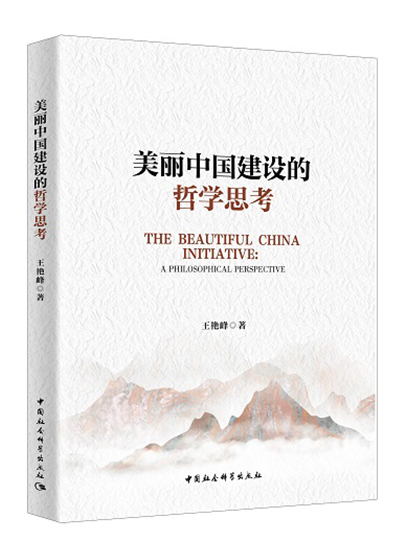Philosophical thinking on Beautiful China Initiative

The Beautiful China Initiative: A Philosophical Perspective
The Beautiful China Initiative: A Philosophical Perspective, written by Wang Yanfeng, a research fellow from the Shandong provincial Party school, focuses on the theoretical connotation of the major national strategy of the Beautiful China Initiative using Marxist philosophy.
The ecological crisis is essentially the crisis of human society, and the underlying cause is the complex relationship of interests. On this basis, Wang reveals the harmonious symbiosis of society and nature behind the Beautiful China Initiative, and analyzes the historical inevitability and value rationality of constructing the initiative. The author proposes seeking the reconciliation between man and nature by solving the contradiction between man and man, and man and self, advancing the discussion of the Beautiful China Initiative from the views of nature to social history.
The theoretical and practical innovation of building the Beautiful China Initiative is a new fruit of Xi Jinping’s thought on ecological civilization, a new extension of contemporary Chinese Marxist ecological theory, a new exploration of the uniquely Chinese path to modernization featuring harmonious coexistence between man and nature, and a new thinking on the way of human survival and sustainable development. The book starts the theory of building the Beautiful China Initiative from the people’s needs for a better life, and reviews the initiative’s historical position, basic connotation, theoretical origin, philosophical basis, and practical approach employing Marxist “natural history—human history” systemic thinking. It puts forward new connotations, new features, new ideas, and new paths for building the initiative, forming the basic outline and theoretical analysis framework of the initiative.
In terms of theoretical construction, the author reveals the historical, ethnic, and practical characteristics of constructing the Beautiful China Initiative from the dimensions of time, space, and survival and development, based on the historical conditions that socialism with Chinese characteristics has entered a new era, and within the spatial vision of global ecological governance. The Beautiful China Initiative is the objectification of the Chinese people’s needs for a better life in the new era, an objectification activity constructed according to the “laws of beauty.”
The book reveals original theoretical contributions of the initiative, including the ontology of harmonious coexistence between humans and nature, the view of history that “a civilization may thrive if its natural surroundings thrive,” the people-centered axiology, and the view of development that “clear waters and green mountains are as good as mountains of gold and silver.” Then it advocates the principles of the unity of the true, the good, and the beautiful, the unity of the measure of things and the measure of man, and the unity of scientificity and value, and constructs the basic path of building the Beautiful China Initiative under the guidance of the system theory.
Xu Weixin is former vice president of the Party School of the Central Committee of CPC (National Academy of Governance).
Edited by YANG LANLAN
